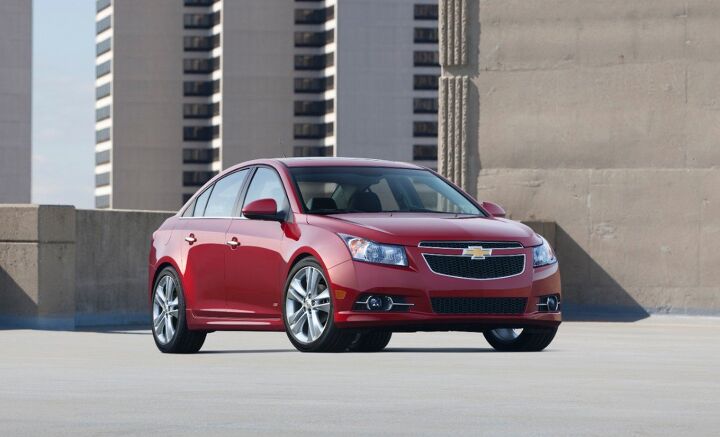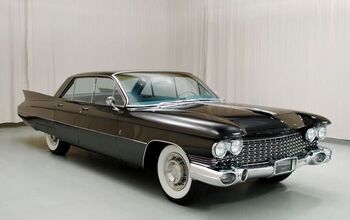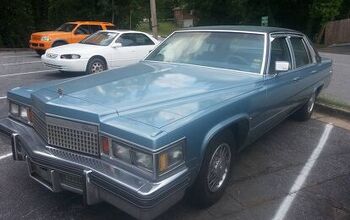Chevrolet Cruze: Success or Failure?
There was a time when the word ‘cockroach’ was the best way to describe any old Chevy compact.
The Cobalts and Cavaliers of recent times were essentially neutered, cost-cutting exercises designed to help General Motors sell as many high dollar pickups and SUVs as possible. To this day, it’s hard for me to think of two other modern cars of the last 10 years with a cheaper assemblage of foam, fabric, plastic and parts-bin rubbish than GM’s two big C’s of the compact car world.
Yet they sold exceptionally well. Or to put it another way, they sold far better than any human being could ever assume would be the case. I’m sure that rental car companies, generous rebates and jaw dropping incentives all helped each of these cars limp through the final years of their model runs. But the reliability of the Cavalier and Cobalt were actually quite decent for their time. In fact, like a lot of GM vehicles, the Cavalier and Cobalt were pretty well screwed together by the end of their model runs.
Now about the Chevy Cruze!
When the Cruze was released back in 2011, a lot of the writers here had a ton of praise for the then new model. Michael Karesh offered a striking take on the ECO version. I provided a longer test drive for the LT model and, several years later, Jack Baruth provided some healthy insights to what had become a worthy contender to the top names in the compact car segment.
However, the last two years are starting to cultivate a bit of a fracture between the Cruze models. I remember Mark Baruth and Caroline Ellis contacting me about whether I would recommend the Chevy Sonic, which has the same 1.8-liter engine as the overwhelming majority of the Cruzes sold in North America. The short answer was, “Absolutely!” Everything about the 1.8 liter was worthy of a long-term investment.
However, I had mixed feelings about the 1.4-liter engine from the very beginning. It runs hotter (220 to 230 degrees), has a turbo thrown into the mix (which has no track record of long-term reliability) and didn’t provide that much more oomph than the 1.8. The anthem dished out by the Chevrolet PR circus was More powah!, but everyone from Jalopnik to Consumer Reports dissed the 1.4 turbo as a mostly pointless endeavor.
Consumer Reports hit the nail on the Cruze’s cylinder heads:
Our base Cruze had the 1.8-liter four-cylinder; our higher-end 1LT version came with the 1.4-liter turbo four cylinder. While the 1.4-liter feels marginally more powerful in daily driving, it was barely faster to 60 mph, and it got the same fuel economy as the larger engine—26 mpg overall.
The marketplace responded in kind with the easy-breathing 1.8 becoming the engine of choice for the Cruze and even the far sportier Sonic. The 1.4 turbo would also wind up with more troubles than the 1.8. Water pump failures, overheating engines, and having to resort to trial-and-error fixes made many 1.4 owners rue the day they chose the smaller engine over the larger one.
Yet you can’t argue with the sales success of the Cruze. Is it outstanding? No. But it’s most definitely the most stable GM offering in this market segment since the Clinton Era. The basic architecture that powers the Cruze has also found a healthy home in millions of other GM vehicles throughout the world — from the Verano, to the Volt, to models that arguably should have never been produced.
The one thing I’m wondering about at this point is whether the Chevy Cruze has enough staying power to become a worthy offering in the used car market. The average car on the road in the USA is now 11.5 years old and over the next few years the Cruze will be drifting ever closer to that national average.
Would you recommend one? How about the 1.4? Do you think GM is going to solve the issues for that model and make it a long-term hauler? Or is the General going to blaze the same path of denial that often results in the used car owner holding the 3,300 pound bag well after the vehicle leaves the spotlight?
In GM’s defense, they have arranged for recalls related to the water pump issue, but a recall and a genuine fix for the damage caused by the problem are two highly divergent realities when it comes to engine life. Should GM extend the warranty for those engines that overheated before the initial warranty period went out?
Author’s Note: I am leaving the Cruze diesel engine completely out of the conversation since like 99.99% of humanity, I have absolutely no firsthand experiences with them. But if you have, feel free to leave your input below.
More by Steven Lang
Latest Car Reviews
Read moreLatest Product Reviews
Read moreRecent Comments
- Daniel J Cx-5 lol. It's why we have one. I love hybrids but the engine in the RAV4 is just loud and obnoxious when it fires up.
- Oberkanone CX-5 diesel.
- Oberkanone Autonomous cars are afraid of us.
- Theflyersfan I always thought this gen XC90 could be compared to Mercedes' first-gen M-class. Everyone in every suburban family in every moderate-upper-class neighborhood got one and they were both a dumpster fire of quality. It's looking like Volvo finally worked out the quality issues, but that was a bad launch. And now I shall sound like every car site commenter over the last 25 years and say that Volvo all but killed their excellent line of wagons and replaced them with unreliable, overweight wagons on stilts just so some "I'll be famous on TikTok someday" mom won't be seen in a wagon or minivan dropping the rug rats off at school.
- Theflyersfan For the stop-and-go slog when sitting on something like The 405 or The Capital Beltway, sure. It's slow and there's time to react if something goes wrong. 85 mph in Texas with lane restriping and construction coming up? Not a chance. Radar cruise control is already glitchy enough with uneven distances, lane keeping assist is so hyperactive that it's turned off, and auto-braking's sole purpose is to launch loose objects in the car forward. Put them together and what could go wrong???




















![General Motors Puts Stop-Sale & Recall On Chevrolet Cruze Due To Axle Failure [W/ Full Text]](https://cdn-fastly.thetruthaboutcars.com/media/2022/07/10/8944488/general-motors-puts-stop-sale-recall-on-chevrolet-cruze-due-to-axle-failure-w.jpg?size=350x220)














Comments
Join the conversation
I once test drove a Cruze 1.8 with manual transmission. Loved the drive and responsiveness. Hated the seats. No sale.
▼ Speaking of GM & Cruze ▼ Wed 03 Feb 2016 @ 10:50 http://www.nydailynews.com/autos/chevrolet/chevrolet-cruze-2016-1.2518762 ▲ • Diesel engine coming for 2017 ▲ Returning may be a better word than coming • GM apparently realized the error of the mid→late 1970s with its “conversion” of the 350in³ gasoline engine to diesel • As I understand , GM spent many $ & € to do it right when introducing the Cruze diesel • To me it is amazing that GM did not crawl into bed with the major car rental companies and offer them a sweet ♥ deal to get as many diesels on the road as possible • Prospective buyers could rent one for a weekend or week or two „ and if error , they are not married to the car with its initial off the lot crucifying depreciation •